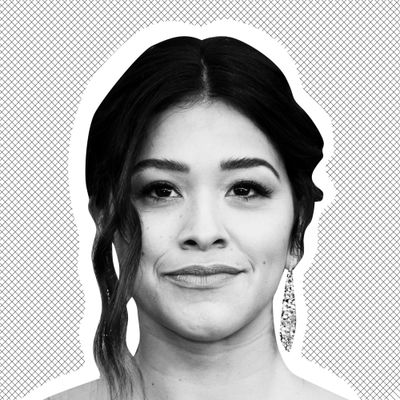
On Tuesday, Gina Rodriguez broke down in tears after she was asked in an interview about criticism that referred to her and some of her recent statements as anti-black. Rodriguez has faced scrutiny for a series of comments she’s made about race and gender in Hollywood — specifically, she’s been accused of pitting black and Latinx actresses against each other, and of shutting down conversations about the specific struggles black actresses face. (Rodriguez insists that she never meant to hurt anyone, and that she dedicates herself to empower all women.)
The conversation regarding Rodriguez is complicated — but here’s a breakdown of her statements, and the criticism that she received for them, which led up to the Tuesday interview.
In 2017, Rodriguez tweeted about inclusion in Marvel and DC films as Black Panther was announced.
When Black Panther began the promotional run leading up to its 2018 release in the summer of 2017, Gina Rodriguez responded to the news by tweeting, “Marvel and DC are killing it in inclusion and women, but where are the Latinos?! Asking for a friend…”
While there is no doubt that Hollywood has far to go when it comes to onscreen representation for people of color and Latinxs more specifically, Rodriguez’s remarks seemingly ignored the Latinx actors already working on Marvel and DC projects — people were quick to point out that Zoe Saldana and Tessa Thompson, both Afro-Latinx, starred in Marvel films. Others pointed to several other Latinx actors also working on DC and Marvel TV shows.
But beyond that, Rodriguez’s timing was called into question. Her remark came along as the first superhero film featuring a black leading cast made its debut, which many considered to be reductive of a moment that wasn’t about her.
During a 2018 press interview, she interrupted co-star Yara Shahidi when she was asked about being a role model for black women.
In the clip above, the interviewer asked Yara Shahidi about how she felt about being a role model to black women. Before Shahidi could answer or the interviewer could finish his sentence, Rodriguez interrupted: “So many women.”
The comment was only a second in a three-minute video clip, but put in context with her previous statement, many perceived that Rodriguez was inserting herself into a conversation she wasn’t invited to and actively attempting to diminish discussions specifically about black women. Some people referred to the moment as Rodriguez “All Lives Matter”–ing Shahidi and the interviewer.
When talking about pay equity in Hollywood, Rodriguez stated that Latinas were paid the least — which isn’t true.
During a Porter roundtable discussion about pay equity and diversity in Hollywood with Ellen Pompeo, Gabrielle Union, and Emma Roberts, Rodriguez stated that Latinas were paid the lowest wages. “White women get paid more than black women,” she said, “and black women get paid more than Asian women, Asian women get paid more than Latina women, and it’s like a very scary space to step into.”
That is true for the general wage gap — but it’s not the case in Hollywood, and there wasn’t any hesitation in pointing this out. Again, Rodriguez’s comments were perceived to be dismissive of her black peers.
When Rodriguez finally addressed the criticisms against her, many found it insufficient.
After months of criticism, Rodriguez was asked about her comments on Sway in the Morning. “Have you been able to make sense of the backlash you got last year?” Sway’s co-host Tracy G asked Rodriguez, referring to the Porter roundtable.
“I wasn’t speaking about my industry,” Rodriguez began. “I always find it difficult to talk about equal pay as a woman who makes a substantial amount of money … what I was saying was that when we talk about equal pay, we have to talk about intersectionality, because we all must rise.”
She described the response to the Porter interview as “devastating,” adding, “The black community was the only community that I looked towards growing up. We didn’t have many Latino shows, and the black community made me feel like I was seen.”
At that point in the interview, Rodriguez was crying. “So to get anti-black is saying that I’m anti-family. My father is dark-skinned, he’s Afro-Latino … If anything, the black community is my community. As Latinos, we have black Latinos. That is what we are. I am not, so I think that when I speak about Latino advocacy people believe I only mean people of my skin color.”
“If I have hurt you, I am sorry and I will always be sorry, but you have to know that, until you know my heart, there’s no way that we can live off clickbait, you guys,” Rodriguez continued. “You are allowed to feel pain and I empathize with your pain, and I’m sorry if I caused your pain because it is the last thing I want to do … We don’t need to fight each other and if I caused that notion, please forgive me because that is not my intent at all.”
People who were offended by her initial comments didn’t find her explanation, or her apology, to be sufficient. Instead, Rodriguez was accused of avoiding giving an apology that included taking responsibility.
“Gina Rodriguez could easily acknowledge that her past comments were antiblack (regardless of if she didn’t intend them to be) and learn to do better and grow but she rather play victim,” wrote one user. Some people also pointed out that her dad doesn’t actually appear to be dark-skinned, as she claimed.
Rodriguez hasn’t responded to the subsequent criticism.




